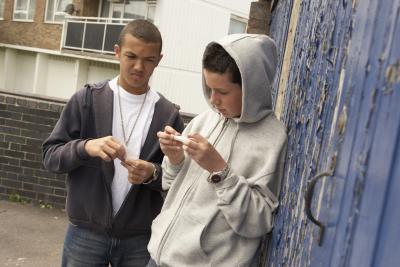A fine line exists between drug abuse and drug addiction. Your teen is abusing drugs if she is using an illegal drug or if she is using a legal substance in the wrong way. Just because a teenager is abusing drugs doesn’t mean she is going to become an addict. However, drug abuse can lead to drug addiction, so it is something you should take seriously.
From Abuse to Addiction
Typically, the first time your teen uses a drug, he likes it and receives pleasurable feelings. If your teen continues to use drugs, the brain stops producing its own pleasure, its dopamine, and the result is that your teen feels down or depressed until he uses the drug again. Your teen eventually needs more and more drugs to produce the same high feelings he got when he first started using the drug. Your teen is actually changing his brain and acts compulsively to get the drug. There is no certain way to tell how many times it takes a teen to abuse a drug before the abuse turns to addiction.
Signs
Look for signs of drug abuse by your teen’s appearance, such as weight changes, unusual pupil size, deterioration in grooming or unusual smells on your teen or on her clothes. Other signs to look for are secretiveness, falling grades, a loss of interest in sports or activities, getting into trouble at school or in the community, loss of old friends combined with a sudden change to new friends, fights at home with family members and money missing from your wallet.
Consequences
Stop your teen from abusing drugs before something serious happens. Your teen can put himself or others at risk by driving under the influence. Teens who abuse drugs are more likely to have unsafe sex and to have drug problems later in life. Drug abuse can also lead to health problems, such as liver or heart failure in the case of Ecstasy, heart and neurological damage, aggression and psychotic behavior from methamphetamine, brain or nerve damage from inhalants and depression, seizures and cardiac or respiratory distress from prescription or over-the-counter medication abuse.
Underlying Problems
Drug abuse usually masks an underlying problem your teen faces. Maybe your teen has stress at home or at school. Maybe he needs extra energy to keep up with his activities and his grades. Maybe he needs to calm down because he feels anxious much of the time. Various drugs can numb depression, help deal with stress, give energy, confidence or help with sleep. Drugs, however, are only short-term fixes. Help your teen by treating the underlying causes of his drug abuse.
Getting Help
You don’t have to wait until your teen is addicted to drugs before getting help. You can help her stop abusing drugs, too. The earlier you catch the behavior, the better. Once abuse turns to addiction, it is more difficult to treat. Start by telling your teen that you know she is using drugs. Don’t be judgmental; just listen. Next, set down rules and consequences for further drug abuse. Get help from a counselor at school, a drug counselor, a therapist, your child’s coach, a religious leader, a teacher, a family friend or your family doctor.





